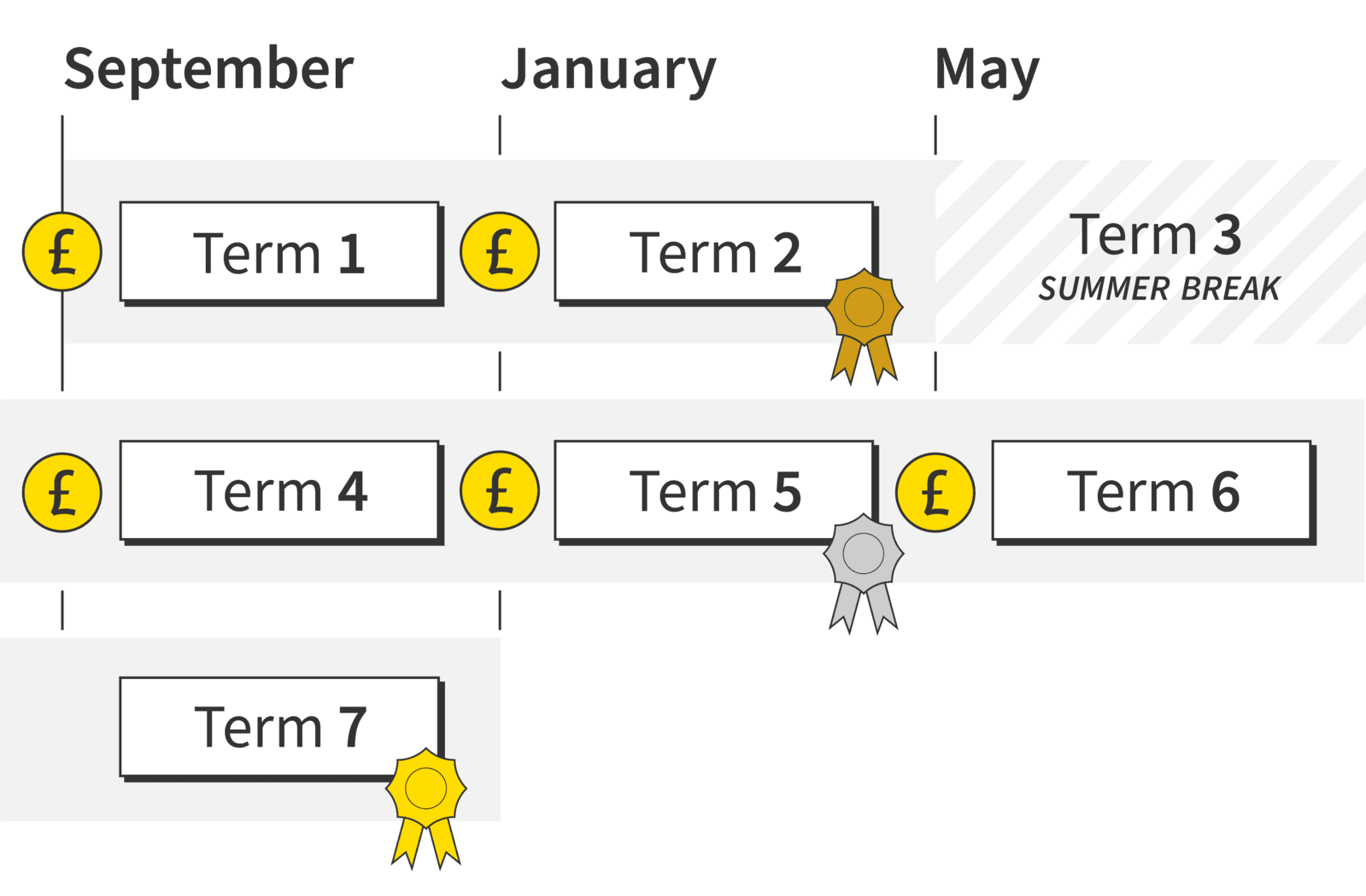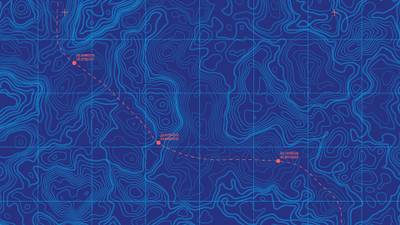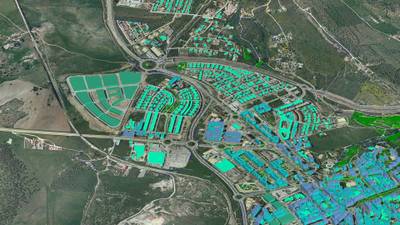Study part-time or full-time with our online MSc Data Science.
Recent advances in data science have been seismic. Big data, predictive analytics, and AI technologies like ChatGPT and Copilot are revolutionising the way organisations automate processes, predict trends, and engage with customers.
As the volume, diversity and complexity of data being gathered continues to grow, the big challenge facing organisations today is how to analyse this data and use it to inform business decisions.
Join our online Masters in Data Science and you’ll learn to do just that.
Why this online data science degree is different
You’ll go beyond classical statistics and big data in this degree.
You’ll set yourself apart by gaining additional skills in computational thinking (CT), programming, sequencing and algorithms, allowing you to gain better insights from data and create solutions to problems across disciplines and industries.
Who can join our online MSc in Data Science?
You do not need to have a background in maths or programming to join our online MSc.
Its multidisciplinary and multisector focus means we welcome applications from a wide range of academic and professional backgrounds, including the humanities, business and social sciences, as well as science, technology, engineering and medicine.
You can also study MSc Data Science on campus.
Aligned with industry

We’ve designed this degree in collaboration with industry partners, including Wolfram Research, to ensure you cover the algorithms, tools and workflows required by industry.
You’ll learn to use Wolfram Mathematica and programming fundamentals that underpin languages including Python and R.
By the end of this degree, you’ll be able to...
-
Utilise the algorithms, tools and workflows used at the forefront of data science today, including Wolfram Mathematica.
-
Apply analytic and computational thinking skills to extract knowledge from data.
-
Work effectively in multidisciplinary teams to extract knowledge and insights from data.
-
Combine mathematical modelling and programming skills in the context of data science.
-
Produce meaningful data insights that organisations can use to improve their performance.
Choose the University of Aberdeen for your online Masters in Data Science

Earn a respected Masters degree
You’ll earn the same globally recognised Masters degree online as you would on campus.

Over 525 years of excellence
You’ll graduate from the fifth-oldest university in the English-speaking world, founded in 1495.

20% alumni discount
University of Aberdeen alumni receive 20% off fees for this online degree.
What you’ll study
You’ll study the following courses that make up the 180 credits of this Masters degree.
You can also choose to exit early, earning a:
- Postgraduate Diploma (120 credits), or
- Postgraduate Certificate (60 credits).
How you’ll study
Online learning
This distance-learning MSc Data Science is delivered 100% online.
You can learn with us anywhere in the world, no student visa required.
Your teaching
Teaching is delivered through MyAberdeen, our online Virtual Learning Environment (VLE). It holds all the materials, tools and support you’ll need in your studies. Take a look around MyAberdeen.
You can access your learning materials on computer, smartphone and laptop, 24 hours a day. You’ll find a range of resources available, including online access to our award-winning Sir Duncan Rice Library.
Your tutors
You’ll learn from a team of academic experts from our School of Natural and Computing Sciences, who work in data science and mathematical modelling.
Industry input
We have strong links to industry and developed this degree in collaboration with industry partners, including Wolfram Research. This ensures you’ll cover the algorithms, tools and workflows needed by industry today.
Assessments
MSc Data Science is assessed entirely online. You’ll have a range of assessment methods throughout your degree, including online tests, essays and projects.
Hours for taught courses
Each 15-credit course that’s part of this degree is taught intensively in a six-week block.
You need to be able to dedicate around 20 - 25 hours per week to each course you take.
Each course:
- totals around 150 hours of study and assessment time
- is taught for six weeks, followed by an assessment
- takes around 20 - 25 hours per week to complete.
This is an indicative guide to the time required for a typical student at this level to achieve the learning outcomes. This includes time for independent study, as well as teaching and assessments.
Vary the pace
You can choose to study part-time or full-time.
Each term is 13 weeks long, so you can:
- study part-time, taking two six-week courses per term, one after the other, or
- study full-time, taking four courses per term, studying two at a time.
Activities at fixed times
There will be some activities that are scheduled at fixed times, such as online meetings with your tutor, or assessments with deadlines.
You can to an extent set your own study hours each week to cover the materials. MyAberdeen is available 24/7, so you can log in and study around the clock.
Hours for 60-credit project
A 60-credit project is around 600 hours of study time. This is around one term of full-time study.
You can dedicate a full term to your project and work on it full-time. Or you can complete it part-time, spreading the hours you dedicate to it over two or more terms.
When you study with us, you can expect a first-class support structure so that you’re never alone in your studies.
But learning online does mean you have to motivate yourself and manage your own time.
Your most important commitment will be time – the time to work through, reflect on and understand your teaching materials.
Before you start a course that involves a high degree of independent study, we recommend looking at the time you will be able to devote to your studies each week:
- Be realistic
- Create a weekly schedule as a guide
If you have any questions about studying online, get in touch with our friendly team. We’re here to help.
Our first-class support structure will ensure that you aren’t alone in your studies. You’ll have contact with your tutors via MyAberdeen and email. You can use social media and discussion boards to chat with your fellow students too.
We provide a wide range of services to support you in your studies and beyond:
- Careers and Employability Service – including one-to-one advice sessions
- Disability support
- IT support
- Library support
- Student Support Service – help with finances, stress, wellbeing and non-academic issues
- Student Learning Service – study support, with advice sessions available via phone or Skype
- Aberdeen University Students’ Association (AUSA) – run by students for students
- Toolkit – clever apps and free training that can make your study life easier
Wherever you are in the world, you’ll feel part of our very special Aberdeen learning community.
We’re a member of the Access scheme run by the Society of College, National and University Libraries (SCONUL).
Access study spaces, books and journals in your area
The SCONUL Access scheme allows you, as a University of Aberdeen student, to access books and resources at university libraries across the UK and Ireland, or visit them for a quiet place to study.
You’ll be able to use study spaces, books and journals at over 150 university libraries which belong to the scheme.
Your support team
Our friendly team are here to answer any queries you have before, during and after your studies.

Professor Marco Thiel
Marco is the degree coordinator. He’ll be on hand to answer any questions about degree content before you start and to help you throughout your studies.

Rowena Hardy
Rowena is part of the School’s postgraduate teaching support team. She’ll be there throughout your studies to answer any of your non-academic queries.

Get in touch
The online education team is here to answer any questions you have right now about this qualification, or about studying online.
Ask us a questionWhere this will take you
Your MSc Data Science qualification
You’ll graduate with a respected MSc in Data Science from the University of Aberdeen, one of the UK’s six ancient universities.
You’ll receive exactly the same degree qualification online as you would on campus. Your degree title will not mention online or distance learning.
Your MSc qualification will be recognised by industry and educational institutions around the world, opening up international opportunities.
Careers
There are great graduate prospects in the field of Data Science.
The demand for data scientists and data analysis experts far outstrips the supply of highly qualified graduates. This is amplified by the fact that there are now very few areas where data analysis skills are not needed.
You’ll graduate from this MSc ready for a range of careers across sectors, including roles as a:
- Business Intelligence Analyst
- Data Architect
- Data Mining Engineer
- Data Scientist.
Average salaries
According to Prospects.ac.uk, entry-level annual salaries for Data Scientists range from £25,000 to £30,000, rising to £40,000 depending on your experience.
- With a few years’ experience, you could expect to earn £40,000 to £60,000.
- Lead and chief data scientists can earn upwards of £60,000, in some cases reaching more than £100,000.

Lifelong career support
Our career support doesn’t stop when you graduate.
You have access to our free careers service while you study, and beyond.
- 1:1 appointments
- CV checks
- Interview prep
- Job opportunities
Fees and funding
The fee quoted above is based on you starting your studies with us in the 2024/25 academic year.
We have confirmed that our fees will rise by 5% for the 2025/26 academic year. Our indicative cost includes a 5% fee rise each year.
Pay as you go
This is a pay-as-you-go degree.
You do not have to pay the full tuition fee upfront.
You can spread the cost and pay as you go, term by term.
How it works
- You decide how many credits to study for each term.
- At the start of term, you pay only for the credits you’re taking that term.
- This gives you control over your costs and workload for each term of your degree.
This is an example payment schedule for tuition fees. It’s based on the typical route through the degree.
You can take more or fewer credits per term than is shown in this example.
Term 1) September – December 2024 | Academic year 2024/25
- Take two 15-credit courses @£1,480 each.
- Fee for term = £2,960.
- Payment due in September.
Term 2) January – April 2025
- Take two 15-credit courses @£1,480 each.
- Fee for term = £2,960.
- Payment due in January.
PgCert exit point
With 60 credits earned, you now have the option to exit with a PgCert.
Total fee for this route to your PgCert = £5,920.
Term 3) May – August 2025
- Summer break. There is no teaching in the first summer of your degree.
- No payment due.
Term 4) September – December 2025 | Academic year 2025/26
- Take two 15-credit courses @£1,555 each.
- Fee for term = £3,110.
- Payment due in September.
Term 5) January – April 2026
- Take two 15-credit courses @£1,555 each.
- Fee for term = £3,110.
- Payment due in January.
PgDip exit point
With 120 credits earned, you now have the option to exit with a PgDip.
Total fee for this route to your PgDip = £12,140.
Term 6) May – August 2026
- Embark on your 60-credit project.
- Fee for project = £3,520.
- Payment due in May.
Term 7) September – December 2026 | Academic year 2026/27
- Complete your project.
- No further payment is due.
MSc complete
On passing your project, you’ll have earned 180 credits and will be awarded an MSc.
Total fee for this route to your MSc = £15,660.

Learning resources
All books and resources you need are included in your tuition fee. They will be available online and you do not have to you buy your own copies.
External hard drive
Because this degree involves handling large data sets, you may have to purchase an external hard drive if you do not already have one, for storing data and coursework.
Printing
You may wish to set aside a small budget for printing, depending on how you like to work.
There are several ways you may be able to get help funding your studies:
- Employer sponsorship – we accept full and partial fee payments from sponsors
- Student loans
- Scholarships – search our funding database for scholarships
Find out more about funding options.
Student card
All our students are entitled to a University of Aberdeen student card. This gives you access to a range of student discounts around the city and online.
20% Alumni discount
You’re entitled to 20% off our postgraduate taught degrees and short courses if you have a degree from the University of Aberdeen. View Alumni discount details.
How discounts work
Discounts are applied during your application process. You can only use one discount per application.
Entry requirements
MSc, PgDip and PgCert
- A 2:2 (lower-second) honours degree (or equivalent) in any subject.
This is our minimum entry requirement. It is given as a guide and does not guarantee entry.
Entry requirements
We welcome students from all over the world.
See the minimum entry requirements above. If you do not have qualifications from the UK, check equivalent qualifications from your country.
Visa requirements
You do not need a student visa to study online with us.
English language requirements
Teaching is delivered in English.
If English is not your first language, use our English requirements checklist to see if you need to provide evidence of your English language skills when you apply.
English language tests and scores
If you do need to provide English language test scores, these are the tests and minimum scores we accept for this course or degree.
These are our Postgraduate Standard requirements.
IELTS Academic, IELTS UKVI Academic, and IELTS Online (not IELTS Indicator or IELTS General Training)
- 6.5 overall
- 5.5 for listening, reading and speaking
- 6.0 for writing
TOEFL iBT and TOEFL iBT Home Edition
- 90 overall
- 17 for listening
- 18 for reading
- 20 for speaking
- 21 for writing
- TOEFL DI code is 0818
Cambridge English: B2 First, C1 Advanced, or C2 Proficiency
- 176 overall
- 162 for listening, reading and speaking
- 169 for writing
LanguageCert Academic/LanguageCert Academic SELT
- 70 overall
- 60 for listening, reading and speaking
- 65 for writing
LanguageCert International ESOL B2 Communicator (Written and Spoken) – Online / In-centre
- Overall High Pass
- 33 for listening, reading and speaking
- 38 for writing
Oxford ELLT Digital – English Language Level Test Online
- 7.0 overall
- 5.0 for listening, reading and speaking
- 6.0 for writing
PTE Academic (online test not accepted)
- 62 overall
- 59 for listening, reading, speaking and writing
Duolingo – tests taken from 1 July 2024 onward
- 120 overall
- 95 for listening, reading and speaking
- 105 for writing
University of Aberdeen English Pre-sessional Programme (PSE)
- Pass
- Valid for one year. Refresher can be offered if out of date
Pre-sessional academic English preparation programmes undertaken at other UK universities
- Pass at an equivalent of 6.5 (C1)
- B2 in all four skills
- Certification must be within one year prior to the start of your course
For full information about language requirements, see our English Language Requirements page.
You apply through our online Applicant Portal. It allows you to upload relevant qualifications and documents.
What you need to apply for this degree
- Degree transcript
- Personal statement
- Degree certificate
- CV / Resume
Apply now
Start with our step-by-step guide. It explains degree transcripts, what to write in your personal statement and how to use our Applicant Portal.
You can apply to start in either September or January.
Apply as early as you can. This is so we have time to review your application and get a decision to you. We also want to ensure you have time to enrol before teaching starts.
September 2024 intake
For our September 2024 intake, the application deadline is 8 September 2024.
You will need to accept your offer and provide any outstanding documents to meet the conditions of your offer by 15 September 2024.
Teaching starts on 23 September 2024.
January 2025 intake
Teaching starts on 27 January 2025.
Application deadlines will be announced in due course.
Studying Data Science involves storing and processing large datasets. You will need:
A computer (PC, laptop or Mac) operating on either
- Windows 10 or later; in this case you would ideally have a secondary Linux system installed.
- macOS 10.15 (Catalina) or later.
Computer specifications
Any desktop or laptop should be the highest spec you can afford, with:
- a minimum of 16GB RAM (ideally 32GB or more); 8GB will suffice for most content, but will not be sufficient for the analysis of some datasets.
- a good graphics card (ideally, but not necessarily, NVIDIA).
- a fast processor (ideally Intel i5, i7 or i9).
- a sizeable hard drive or SSD (ideally 1TB or above).
External hard drive and memory stick
For storing and backing up your data and coursework, we suggest using an external hard drive with at least 1TB of storage space.
Reliable internet access
We recommend:
- a wired connection
- a minimum 6Mbps download speed and 2Mbps upload speed so you can take part fully in live sessions.
We will occasionally download large datasets or connect to databases, requiring fast connection speeds.
Speakers or headphones
- We recommend a headset with built-in microphone and earphones if you’re likely to study in an environment with background noise.
- A webcam is optional, but you may like to use one from some interactive sessions.
Software
We’ll give you access to Office365 applications. This means you can use online versions of Microsoft Word, Excel, and PowerPoint and install these programs on up to five personal devices.
If a course requires any specialist software, we’ll provide you with access to this and a licence that lasts throughout your studies.
See our detailed IT requirements for more information.
Master of Science
180 credits
£15,660
This indicative cost is based on 180 credits of study over two years, starting in September 2024.
Apply for this programme
- Start month
- September or January
- INDICATIVE COST
- £15,660
This indicative cost is based on 180 credits of study over two years, starting in September 2024.
Apply via our Applicant Portal






